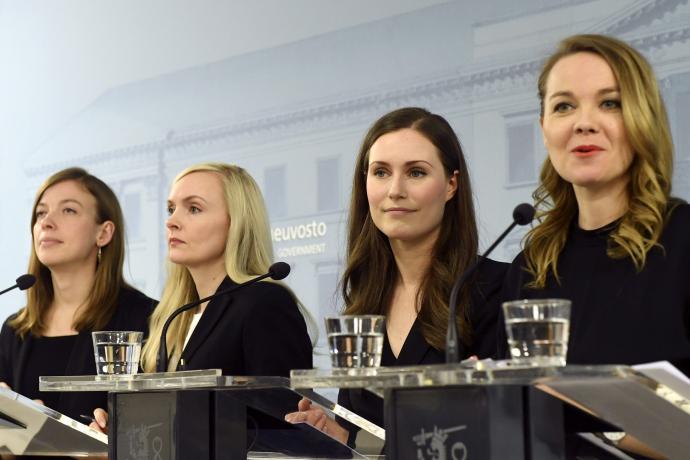Greater gender equality leads to greater wealth and security for all
In 2014, Margot Wallström, then serving as the foreign minister of Sweden, proclaimed that the Swedish government would adopt a so-called feminist foreign policy, becoming the first nation ever to do so. Since then, Canada, France, and Mexico have followed suit, and a handful of other nations—most recently, Luxembourg, Malaysia, and Spain—have pledged to develop similar policies.
In each of these countries, the announcements have provoked questions among foreign policy experts. What, exactly, do these policies set out to achieve? At a time of rising global activism for gender equality, what does it mean to conduct foreign policy from a feminist perspective? And in an era of economic uncertainty, is a focus on gender equality an unnecessary distraction?
Evidence from recent studies suggests that the status of women is closely aligned with a country’s prosperity and security. In this respect, promoting gender equality as a foreign policy priority seems like common sense. Closing the gender gap in workforce participation could add as much as $28 trillion to the global GDP.
Ensuring women’s meaningful participation in peace processes makes agreements more likely to last and be implemented. The more women there are in a country’s parliament, the lower the incidence of human rights abuses and conflict relapse. Equalizing access to agricultural resources for women could result in 150 million fewer hungry people on the planet. The bottom line: research confirms that nations seeking to fortify their own security, better use foreign aid, or support stable and democratic partners should prioritize women’s advancement.
Women’s rights have had a place in public policymaking since at least the late 1970s, supported by both international institutions and a proliferation of local ones in more than 100 countries. But national reforms have primarily addressed domestic concerns. A feminist foreign policy offers something different, in that it promotes programs that make gender equality and women’s empowerment central to national security, including diplomacy, defense, aid, and trade.
The government of Sweden has undertaken the most comprehensive plan of this type with the feminist foreign policy it first articulated in 2014. But the Swedish policy actually builds on the prior efforts of many other nations. Such efforts share a focus on promulgating change in three broad areas. They seek to promote women’s leadership, to commit to policies that advance equality, and to allocate resources in a manner that supports those commitments. The specific initiatives governments have proposed vary, as do the extent of their implementation and the means of measuring their success. And although all aim to elevate gender equality as a foreign policy priority, not all are explicitly termed ‘feminist’.
Over the last decade, many countries have brought more women into their foreign policy decision-making circles and placed greater emphasis on gender equality in their conduct of foreign affairs. Today, a record 34 countries have female foreign ministers, 84 have female ministers of trade, and 20 have female ministers of defense. Several countries have established ambassador-level positions to promote women’s issues abroad or within their foreign policy apparatus. Not all of these countries have signed on to a foreign policy unequivocally dedicated to advancing women’s rights, but the shifts in their leadership have diversified foreign policy debates and led to effective policies.
Countries with and without explicitly feminist foreign policy agendas have pursued policies and dedicated resources that further gender equality, some of them adopting specific plans to address women’s rights through diplomacy and development cooperation. Eighty-three nations have adopted national action plans to encourage women’s participation in peace and security processes. Donor countries, including Australia, Canada, and the United Arab Emirates, have pledged a percentage of their foreign-assistance funds to programs that promote the advancement of women, or they have created new pooled funds to support women’s rights organizations. These efforts add up to a collective shift in resources and political will.
The effort to change leadership, adopt policies, and commit resources in order to advance gender equality as a foreign policy priority has met with some skepticism. Critics argue that increasing the focus on women’s rights and gender equality detracts from promoting other national interests abroad. Even many who believe that gender equality is a worthwhile goal do not agree that it should be institutionalized as a foreign policy priority.
Such criticism overlooks evidence that gender equality is not only a human right worthy of protection but also a means to advance a country’s economic and security interests. Raising the status of women and girls has been shown to increase GDP, improve global health, combat radicalization and extremism, improve the chances of lasting peace, and strengthen democracy. The world confronts too much poverty, insecurity, authoritarianism, and violence for any nation to afford to overlook the talents and contributions of 50 percent of its population.
Other skeptics argue that a true feminist foreign policy would require nothing short of a transformation in international relations. These critics maintain that the feminist policies that the governments of Canada, France, Sweden, and other countries have adopted do not do enough to reshape aid infrastructure, decrease militarism, address the root causes of inequality, or incorporate the experiences of women and girls. But to the extent that such critiques are valid, they risk making the perfect the enemy of the good. Moreover, policies promoting gender equality in the national security space are relatively new, and it is still too early to know just what effects they will have, whether on improving the lives of women or on generating the political will to bring about further change.
– By Rachel Vogelstein, Jamille Bigio, and Rebecca Turkington

